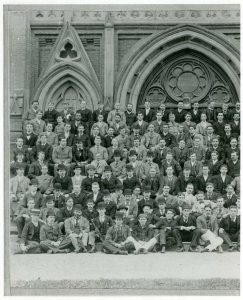In early 1944, shortly after the liberation of Kyiv, the Yiddish poet Dovid Hofshteyn (1889–1952) returned home from evacuation and was confronted firsthand with the horrors of the Holocaust. This encounter moved him to pen the passionate essay Muzeyen fun shand (Museums of Shame).[1] As a writer who had lived through pogroms and civil war, Hofshteyn was no stranger to expressing his reaction to violence and destruction through literature. When Nazi Germany invaded the Soviet Union in June 1941, he became a member of the Jewish Anti-Fascist Committee (JAC), a group largely made up of Soviet Jewish cultural figures whose work was meant to reach a Jewish audience both within and outside the Soviet Union. In an attempt to rally political, financial, and military support for the Soviet war effort, their work was regularly sent to Yiddish presses in the United States, Canada, and Great Britain but also as far as Argentina and South Africa. It was this position as a member of the JAC which made it possible for Hofshteyn to receive information from the front while he was evacuated, to write, and eventually, along with a group of other writers, return home and survey the devastation. „Brett Winestock: MUSEUMS OF SHAME: Dovid Hofshteyn’s Vision of Holocaust Remembrance“ weiterlesen
Schlagwort: Gedenkkultur
A “MODEST MONUMENT” AWAITING COMPLETION. Gianna Zocco talks to Jean-Ulrick Désert and Dorothea Löbbermann about the W. E. B. Du Bois Memorial at the Humboldt University of Berlin

A picture from the late nineteenth century showing about one-hundred students (fig. 1) – all of them male and similarly dressed in suits and neckties, some of them wearing hats. They display a degree of homogeneity unusual by today’s standards. An attentive observer will nonetheless detect that one of the students differs from his colleagues: he has significantly darker skin. The young man, seated in the second row from the top, is the African-American W. E. B. Du Bois (1868–1963), who was enrolled at the University of Berlin from 1892 to 1894.[1] When, in the hopefully not too distant future, the bustling university life resumes, when students cram into crowded lecture halls again, push through full corridors, past perhaps intimidating, perhaps inspiring sculptures, portraits, and other visual reminders of the apparently glorious past their alma mater is connected to, students of the Humboldt University will come across a memorial for Du Bois, one of the first American sociologists, co-founder of Pan-Africanism, civil rights activist, and prolific author of books such as The Souls of Black Folk (1903). „A “MODEST MONUMENT” AWAITING COMPLETION. Gianna Zocco talks to Jean-Ulrick Désert and Dorothea Löbbermann about the W. E. B. Du Bois Memorial at the Humboldt University of Berlin“ weiterlesen
